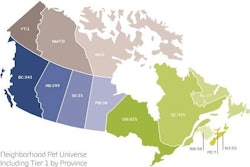
If you’ve heard doomsday scenarios from pet industry experts about the decline of the pet-loving Baby Boomer generation—coupled with the fact that pet ownership tends to drop among older people—take heart. Millennials have supplanted Boomers as the largest US pet-owning population, according to data released by research firm GfK during Global Pet Expo 2015. That means 35.2% of the US’ 75 million Millennials, defined by GfK as people age 18 to 34, own a pet, compared to 32.8% of Boomers.
While the American Pet Products Association’s (APPA) 2015-2016 National Pet Owners Survey (also released during Global Pet Expo) still puts Baby Boomers in the pet-owning lead at 37% of US households, the report highlights that 10% of US pet owners are new to ownership, equating to nearly 8 million new pet owners within the last year, the majority of which are Gen X and Gen Y (Millennials).
GfK’s data show 51.6% of all US households own a dog or cat; among Millennial households, the percentage rises to 57%, with another 20% reporting they intend to get a dog or cat. Further, pet-free Millennials are 39% more likely to own dog or cat in the future, GfK says, and are 77% more likely than any other generation to get a dog or cat while unmarried and not a parent. In other words, they’re becoming pet owners earlier in their adult lives while simultaneously putting off other, more traditional life changes.
For pet food manufacturers and marketers, probably the most positive findings from GfK indicate that 63% of Millennials agree pets should be pampered. Yet, they do shop differently than other generations of pet owners. On this, the GfK and APPA surveys mainly agree that Millennials:
- Are influenced by what’s hot (including celebrity endorsements) and what’s not;
- Like to try the latest technology and new products/services;
- Like customization;
- Spend more on the pets themselves as well as on veterinary care and pet services;
- Are not brand loyal;
- Are less likely to seek products promoted as “made in the USA”;
- Are highly likely to use social media to connect with brands, research products and services, and read and post reviews and ratings;
- Seek the advice of others, especially family and friends (often through social media), before making a purchase;
- Are more likely to participate in the “shared economy” (using services such as Uber for transportation or Airbnb for travel lodging);
- Buy brands and products that reflect their lifestyle or are consistent with the image they want to convey;
- Purchase brands that support a cause they care about, either social or environmental.
Pointers, perhaps, for your future pet food product development?
More on Millennial pet owners
www.petfoodindustry.com/blogs/7-adventures-in-pet-food/post/5031

















